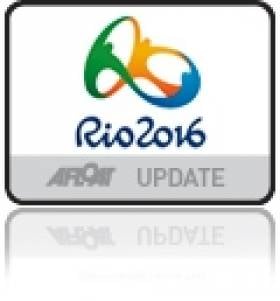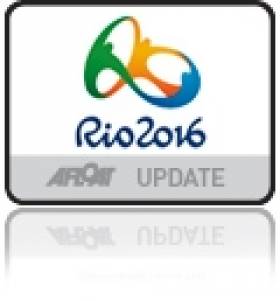Displaying items by tag: Kitesurfing
Bitter Blow for Kites as Windsurfing is Reinstated in Olympics
#OLYMPICS - Windsurfing has been reinstated in the Olympic Games programme at the expense of new class kitesurfing after a vote by the International Sailing Federation (ISAF) yesterday, as Eurosport reports.
It had been expected that sailing's world governing body would reach a compromise of sorts at its annual general meeting in Dun Laoghaire by keeping both classes in the Rio Games in 2016.
The original decision to replace windsurfing with the new sport of kitesurfing back in May was considered a surprise move, but the ISAF has surprised again with its reversal of that decision.
Windsurfing's supporters were said to be "shell-shocked" by the original vote, and vowed to lobby the ISAF to overturn the decision in Dublin, for which they needed a two-thirds majority.
Israel's sailing head Yehuda Maayan told Reuters that delegates had likely been confused about the original vote because of language difficulties, noting that the Spanish delegate had voted for kiteboarding by mistake.
Among those expressing their disappointment at the about face was Virgin founder Richard Branson, who wrote on his blog that the ISAF had "have misled everybody and been very short-sighted in making this knee-jerk decision".
He added: "Their original decision was the right one and a brave one, although my own feeling is that there is room for both sports in the Olympics. If they had to drop anything it should have been one of the less exciting sailing races, which really don't capture the public's imagination."
The move is also a bitter blow for Irish kitesurfer Claudine Murphy, sister of Olympic star Annalise Murphy, who had been campaigning in the new class to make it a sister act at the Rio Games.
In other news from yesterday's ISAF AGM, new members of the ISAF Council have been announced.
Italy's Carlo Croce was elected president and chair of the council that also includes seven vice presidents: George Andreadis (Greece), Chris Atkins (UK), Adrienne Greenwood (New Zealand), Nazli Imre (Turkey), Gary Jobson (USA), Quanhai Li (China) and W Scott Perry (Uruguay).
Also on the council are a non-voting treasurer (yet to be confirmed), 28 representatives from member national authorities (MNAs) and individual representatives from the athletes' commission, the ISAF classes, offshore sailing and women's sailing. Sailing.org has full details on the new council HERE.
from ISAF
Kiteboards Out / Windsurfing Back In
Dun Laoghaire, Ireland: After three days of meetings, the ISAF Annual Conference drew to a close Saturday as the final decisions affecting the sport moving forward were made.
23 submissions relating to the events and equipment for Rio 2016 were received by ISAF in advance of the Conference. In accordance with the ISAF Regulations, before the detail of any of these particular submissions could be discussed, Council were required to vote on a motion to re-open the debate on the subject. The Regulations specify that 75% of members must agree to the motion.
The submissions were presented as six proposals and Council asked to vote on them in terms of the specific changes they proposed. The first proposal grouped. 26 Council members voted in favour and 12 were against.
Proposal 2, which featured Submission 063-12, related to Men's Kiteboarding, Women's Kiteboarding and 2nd One Person Dinghy - Finn. 14 Council members voted in favour and 23 were against and 1 abstained.
With 38 possible votes, the 75% requirement was not achieved on either proposal so the events and equipment as approved in May 2012 remain for Rio 2016.
However, at the ISAF General Assembly part of the business for the 106 Member National Authorities (MNAs) who were present was to review any regulations made or amended in any substantive way by Council since the last Ordinary Meeting which was in November 2011.
ISAF had been notified of three amendments proposed by MNAs which concerned the first two lines of Regulation 23.1.4 (Men's and Women's Kiteboarding).
As defined in the Articles of ISAF, decisions at the General Assembly shall be taken by a simple majority of votes of those present and entitled to vote. There were 114 possible voters, including the ISAF President and Vice-Presidents.
After a lengthy debate the MNAs approved the first proposal which reinstated Men's and Women's Boards - RS:X.
ISAF Regulation 23.1.4 now reads:
Men's Board - RS:X
Women's Board - RS:X
Men's One Person Dinghy - Laser
Women's One Person Dinghy - Laser Radial
Men's 2nd One Person Dinghy - Finn
Men's Skiff - 49er
Women's Skiff - 49erFX
Men's Two Person Dinghy - 470
Women's Two Person Dinghy - 470
Mixed Two Person Multihull - Nacra 17
sailing.org
Kite Surf Pro Kicks Off in Achill Today
#KITESURFING - Ten days of top-class kitesurfing action kick off today (19 October) on Achill Island at the Aer Lingus Kite Surf Pro.
Some 36 riders from 19 countries have converged on Galway Bay to tackle the cold Atlantic waters in what marks the first time the tour has been hosted in Ireland.
As previously reported on Afloat.ie, current world number one Patri McLaughlin will be looking to retain his tour lead in the coming days, but may face a stiff challenge from local wildcard entrants Ryan Coote and Keith McGewon.
Meanwhile, local female wildcard Jade O'Connor will join a field topped by championship leader Ninja Bichler from Germany.
The contest is the penultimate stop on the KSP World Tour for 2012, and will be streamed live online via the official tour website.
It will operate with a mobile format, with riders based at the Pure Magic Lodge on the island and heading out to whatever spot produces the best possible combination of wind and waves on any given day.
Ireland to Host First Ever International Kite Surf Pro Championships at Achill Island
#kitesurf – The first event Kitesruf pro event will take place for the first time ever in Ireland at Achill Island, Co Mayo later this month. It will see international competitors take on the famous west coast wind and waves and world-renowned surf conditions. The Aer Lingus Kite Surf Pro is part of the prestigious Kite Surf Pro (KSP) tour and runs from 19-28 October.
Representing Ireland in the event will be Ryan Coote and Keith McGeown (male riders) and Jade O'Connor (female rider), who will take on the top 33 international kitesurfers in what is expected to be a breathtaking battle for the coveted world championship title and the €15,000 prize money up for grabs.
Ireland was hand selected as one of the tour stops as a result of its exposed Atlantic seaboard on the west coast, as well as its warm welcome by locals. The media exposure for Ireland's west coast is massive – KSP is broadcast around the world to 80+million viewers and can also be viewed live during the 10-day event.
The tour couldn't come at a better time, with the injection of tourism funds, but it will offer so much more than that: the sheer energy, the hundreds of colourful kites out at sea and the beach-side entertainment that will accompany this adrenalin-fuelled event is sure to lift the mood for locals and others living on the west coast for many months to come.
The championship is organised by Freeride Ireland and PureMagic Watersports.
The 2012 KSP tour schedule reads as follows:
June 1 to 10 — Cascais, Portugal
September 7 to 16 — Le Morne, Mauritius
October 19 to 28 — Mayo, West Coast, Ireland
November 29 to December 8 — Maui, Hawaii, USA
Video Highlights of Irish Kitesurfing Nationals
#KITESURFING - WorldIrish has posted video highlights of the recent Irish National Kite Surfing Championships on Duncannon Beach as part of the annual Wexford Kite Surfing Festival.
Though the event was marred somewhat by a lack of strong winds which saw the cancellation of the men's competition, the women's and junior divisions made the best of the bad weather, with Tereza Siminova and 15-year-old James Hayden taking the top honours respectively.
Irish Kitesurfing Nationals in Wexford This Weekend
#KITESURFING - The annual Wexford Kite Surfing Festival on Duncannon Beach will once again play host to the Irish National Kite Surfing Championships this weekend 25-26 August.
Presented by the Irish Kitesurfing Association (ISKA) and Wexford-based start-up school Hooked Kitesurfing, the two-day content will present the best in junior, men's and women's kitesurfing in course racing and freestyle events.
As organiser Niall Roche tells Visit Wexford, the global field of competitors will for the first time be reflected with an international judging panel.
"It’s a real boost for the festival and indeed for kitesurfing in Ireland," he says. "This event will be the biggest kitesurfing event on the national calendar this year, we are expecting over 50 kitesurfers to compete."
And aside from the action on the water, the festival weekend includes fun for all the family from water zorbing to archery, face painting, power kite lessons for kids and a beach party with barbecue. Details of events and competition times are available HERE.
Irish Sailing's Sister Act Plan on Rio 2016
#RIO 2016 – It's well known that Annalise Murphy was barely off the water in Weymouth before she committed herself to a further few years sailing hard in the Laser Radial class for the 2016 Olympic Games in Rio de Janeiro.
What's probably less well known is that older sister Claudine has also set her sights on Brazil, campaigning in the new Olympic kitesurfing class.
News of the double campaign in the Murphy household was revealed in The Irish Times by Pamela Duncan prior to Annalise's medal race a week ago.
Claudine says there was "big rivalry" between her and Annalise as both pursued success in the Laser Radial, but they also realised that only one of them could represent Ireland in the class at Olympic level. Annalise showed the potential, and Claudine turned her hand to a different class.
“She’s my best friend in the whole world,” says Claudine, who flew in to support her sister from the Caribbean where she is already hard at work campaigning for a spot at the Rio Games in kitesurfing - a somewhat controversial addition to the Olympic schedule.
Meanwhile, Annalise Murphy and the Irish sailing team were welcomed home with a guard of honour at the National Yacht Club in Dun Laoghaire yesterday evening.
Annalise also announced plans to take things relatively easy for the next year, returning to UCD next month for a science degree.
"I deferred it three years ago as I didn’t want to put a half-hearted approach into college or sailing," she said. "I’m older now and I feel like I can manage things better.”
#KITESURFING - The International Sailing Federation (ISAF) has responded to the legal challenge from the International RS:X Class Association to its decision to cut Olympic windsurfing from the Rio games in 2016 in favour of kitesurfing.
As previously reported on Afloat.ie, kitesurfing was given two medal events at the next Olympics following a mid-term meeting of the ISAF Council in Italy nearly three months ago.
In a statement, the ISAF said it "intends to fully defend the decision of the ISAF Council, which was made in accordance with the ISAF regulations and the defined decision making processes of the ISAF."
Sailing's world governing body said it was "extremely disappointed that this course of action has been taken" - rather than the "normal submission process" to request the council to reconsider its decision at the ISAF AGM in November - "not least because responding to legal claims will incur substantial and unnecessary legal costs for ISAF and for the class itself."
There has been some controversy surrounding the decision to include kitesurfing over windsurfing at the Rio games after claims that the council vote was married by "language difficulties" among the Spanish delegate.
Spain, a long-time windsurfing stalwart, surprised many by joining the 19-17 vote in favour of the newer discipline, which was supported by Ireland's John Crebbin.
Wexford-Based Startup Will Get You Hooked on Kitesurfing
#KITESURFING - The Daily Business Post's recent focus on businesses in Wicklow and Wexford turned its focus to Niall Roche's start-up kitesurfing school based on Duncannon beach.
Roche runs Hooked Kitesurfing, which was set up a year ago to teach people the ins and outs of one of Ireland's fastest growing sports.
"I took a jump to turn my hobby into a business," said Roche, who took a redundancy package from Intel to set up the school - the name of which was inspired by his own addiction to the watersport, watching events on television a decade ago.
"Once you get the kite in your hands the thrill of having some much power, it's unbelievable. I love passing that onto students."
The Daily Business Post has more on the story HERE.
Irish Wheelchair User Joins Kitesurfing Clinic in Athens
#KITESURFING - Northern Ireland's Jenny Ridley will be among those joining a kitesurfing clinic for people with disabilities in Athens, Greece from this weekend, as Surfer Today reports.
The five-day workshop at the Karavi Beach Club in Schinias will be hosted by Christophe Martin, developer of a special kiteboarding seat for paraplegic athletes.
As previously reported on Afloat.ie, Jenny Ridley has been learning to kite on land under the tutelage of friend Jason McGrugan who has worked with her to design a custom seat and board that will enable her to get on the water.
And she's promised to do just that in Greece this week, joining many other abled and disabled riders in the warm Aegean waters.
Martin will demonstrate the latest techniques developed to teach kitesurfing for people with disabilities. Those taking part will get a chance to go on the water using modified catamarans to show how accessible watersports can to be to everyone.
Surfer Today has more on the story HERE.
Kitesurfing Too Dangerous For Olympics Says Expert
#KITESURFING - The decision to include kitesurfing in the 2016 Olympics is a big mistake, a leading expert in the sport has said.
Amit Inbar, who represented Israel in windsurfing at the 1992 and 2000 Olympic Games, told news agency Reuters that kitesurfing is "10 times more dangerous" than windsurfing, and that the International Sailing Federation (ISAF) has failed to appreciate that.
"People have died in kitesurfing," he said, claiming that 130 people had been killed in the sport worldwide. |I'm really scared that we are going to see some very bad accidents."
Meanwhile, Israel's sailing head Yehuda Maayan claims that the vote among the ISAF board to cut windsurfing from the Olympics in favour of kitesurfing was marred by "language difficulties" experienced by the Spanish delegate at the meeting.
As previously reported on Afloat.ie, windsurfing stalwarts Spain surprised many by joining the 19-17 vote in favour of the new discipline, which was supported by Ireland's John Crebbin.
A two-thirds majority would be required by the windsurfing lobby to overturn the decision at the ISAF’s annual general meeting in Ireland this November.
Reuters has more on the story HERE.


























